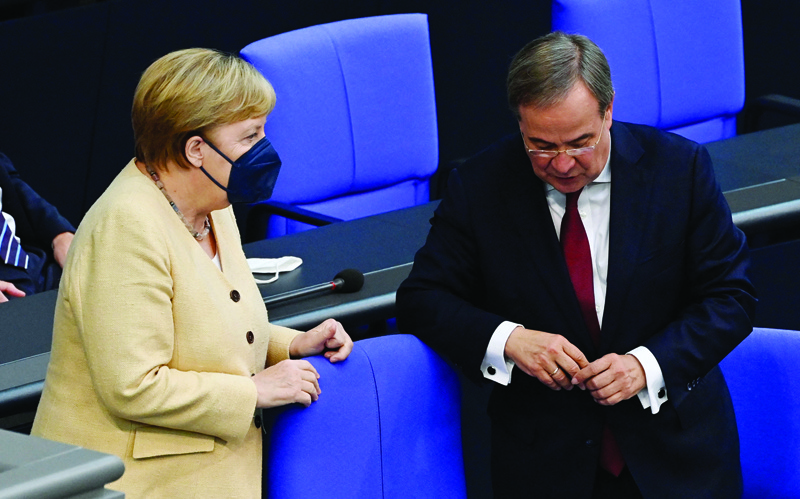 BERLIN: German Chancellor Angela Merkel talks with North Rhine-Westphalia's State Premier and Germany's conservative Christian Democratic Union's (CDU) chancellor candidate Armin Laschet during a session at the Bundestag, the German lower house of parliament yesterday. - AFP
BERLIN: German Chancellor Angela Merkel talks with North Rhine-Westphalia's State Premier and Germany's conservative Christian Democratic Union's (CDU) chancellor candidate Armin Laschet during a session at the Bundestag, the German lower house of parliament yesterday. - AFPBERLIN: German Chancellor Angela Merkel yesterday lauded her party's candidate Armin Laschet as the best choice to succeed her, as polls showed the gaffe-prone Rhinelander still trailing badly ahead of this month's election. Laschet, the chancellor candidate for Merkel's conservative CDU/CSU bloc, was long the favorite to be the next German leader, but his ratings have plummeted following a series of missteps. The frontrunner is now Vice Chancellor and Finance Minister Olaf Scholz, whose centre-left Social Democrats (SPD) are enjoying a late spurt in the final weeks before the September 26 vote.
"It is a special election, not only because no incumbent chancellor is running for re-election for the first time since 1949," the outgoing Merkel said in what was likely her last speech in parliament ahead of the vote. "It is also a special election because it is a decision on the direction of our country in difficult times - and it is not irrelevant who governs this country," she said. "The best way for our country is a CDU/CSU-led federal government with Armin Laschet as chancellor, because his government would stand for stability, reliability, moderation and centrism."
Merkel to the rescue
Merkel, who is retiring after 16 years in power, did not get involved in the race to pick a candidate from her party to run in the elections. But with the Christian Democrats' poll ratings plummeting to their lowest in the post-war period, the party is now encouraging as many joint appearances as possible between Merkel and Laschet.
A poll for the NTV broadcaster published yesterday showed the conservative alliance on just 19 percent, with the SPD out ahead on 25 percent and the Greens - an early favorite in the race - on 17 percent. The CDU/CSU bloc won 33 percent at the last election in 2017 under Merkel, who remains immensely popular with the public.
Merkel appeared alongside Laschet at a digital summit on Monday, and also accompanied him at the weekend on a tour of two towns hit hard by deadly floods in July. In North Rhine-Westphalia, where Laschet is the regional premier, Merkel told reporters he was "leading the largest state in Germany very successfully". "Anyone who can lead a state like this can also lead Germany as chancellor," she said after visiting local officials in charge of the reconstruction effort, insisting her heart was "very much in it" when it came to endorsing him as her successor.
Downward slide
Laschet's response to the floods in his state was the beginning of a downward slide for the 60-year-old, after he was caught on camera joking with local officials during a tribute to flood victims. Things then went from bad to worse when he said in a TV interview that it would be wrong to "change policies just because of one day", in what sounded to many like making light of the catastrophe.
In a bid to reverse the trend, Laschet on Friday introduced eight allies who would serve as ministers or advisors on issues including renewable energy, digitalization and helping the ailing arts sector in the pandemic. If the alliance's fortunes don't improve soon, it could crash out of the chancellery in favor of an SPD-led government. - AFP









